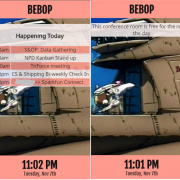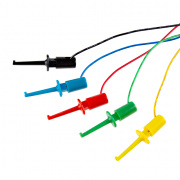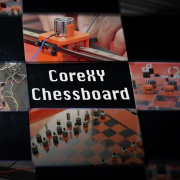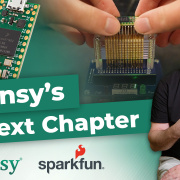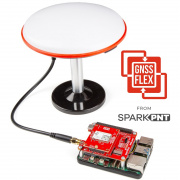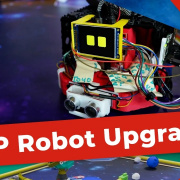RAFT, SparkFun Partner to Help Teachers, Environment
Upcycling manufacturing materials for student STEM projects
RAFT and SparkFun partner to help educators, environment
Getting STEM ‘Stuff’ into Teachers’ Hands
Have you ever gone dumpster diving for project materials? Stephanie Welsh has earned her nickname, “Dumpster Diving Diva,” a hundred times over. RAFT Colorado’s executive director even has a favorite dumpster at a plastics company where she finds corrugated circle punchouts that can become anything from planets in model solar systems to wheels for toy cars.
“Anything that can be a wheel is fantastic,” Welsh beams. “In order to make materials affordable, we need to find sources that are affordable. Usually we try to intercept so we get materials before they hit the dumpster...it keeps us cleaner and doesn’t smell so bad.”
The Colorado Resource Area for Teachers (RAFT) has successfully intercepted the “trash” of 116 companies in the state, including SparkFun Electronics, headquartered in Boulder. SparkFun has been donating materials to RAFT since a few years after the nonprofit expanded to Colorado from its headquarters in San Jose, California.
SparkFun donates approximately 200 pounds of materials a month to RAFT, including PCB scraps, IC tubes, sheet foam, packing reels and packing peanuts. Materials are either used in activity kits, which are available online, or placed in large bins that educators can rummage through (without the stench) to find supplies for hands-on projects or to stock a makerspace.
Since setting up the 29,000 square-foot Denver warehouse in 2008, RAFT Colorado has diverted more than 185,000 cubic feet, or 92 moving truckloads, of materials from landfills and offered the upcycled items at very low cost to educators throughout the state.
But RAFT doesn’t just sell materials; the staff – made up largely of “Re-Imagineers” who have experience teaching in schools or working with students in other capacities – helps teachers change their mindset to thinking about an item’s attributes versus its original purpose. In other words, to think of a thing in terms of what it
“A lot of teachers will come in looking for a specific item to try to fit a specific goal, and we always try to find out what that goal is so we can try to reach it even if we don’t have that specific item,” explains Chris DeKay, chief “Re-Imagineer” at RAFT. “It may be they asked for a 4x8 piece of cardboard, but what they really need is something that’s really large and light and easy to work with – so foam core works better anyway.”
Nicknamed “the MacGyver of Education,” DeKay has experience using the learning materials nature has to offer at outdoor lab schools in the Tetons, Keystone and Boulder. With degrees in six types of biology, including environmental and molecular, he is perfect for the job of essentially bringing materials “back to life.”
“I’ve been tinkering and putting weird stuff together out of weird materials forever, so the mission of RAFT has always resonated with me in using repurposed materials to build hands-on learning opportunities for students,” says DeKay. “Working in the environmental education world, I found it was important to use sustainable practices. Repurposed materials is more of a means to the end of hands-on education as opposed to being an end in itself.”
RAFT has developed approximately 750 free idea sheets to help educators get creative with upcycled materials – while meeting multiple educational standards. About 10 percent of those have been manifested as activity kits, complete with all the materials needed to teach the lesson. The Roller Racer, Solar Jitterbug, Puff Rocket and Flashlight Fun kits all contain upcycled materials from SparkFun Electronics.
SparkFun is well known for its open source electronics and programming kits for students, engineers and hobbyists at all levels. Through SparkFun Education, the company also offers professional development courses and a large catalog of educational resources, including videos and tutorials, to make electronics and programming more accessible.
“Understanding the why and how behind the tech we rely on daily is rapidly becoming an essential skill,” says Glenn Samala, CEO of SparkFun. “We love to challenge the way people think and inspire them to find new ways to interact with the world.”
The partnership between RAFT and SparkFun began in 2012 when RAFT asked its high-tech neighbor to teach soldering at its interactive summer symposium. The following year RAFT helped launch STEMosphere®, where Theresa Stets was conducting science programming for WOW! Children’s Museum, another exhibitor at the event. The former math teacher now serves as coordinator of RAFT’s kits, which are aligned to specific STEM standards.
“What I love about STEM as an approach is the way all the subjects work together and approaching things in an interdisciplinary, project-based way,” says Stets. “Because in life hardly anything is just math or just engineering – so many times it’s all of it together. That allows for kids to have different entry points and bring different strengths to the same project.”
Rachael Rome can vouch for the cross-content differentiation that project-based learning brings. As a speech-language pathologist, she has been able to connect hands-on learning to every communication goal she has for her students. The wired, interactive doll house that 35 kindergarten through fifth grade students worked on for an entire school year is currently on display at RAFT.
Rome talks with her students about the physics behind the structure, and they learned about structural integrity the hard way when the main staircase failed four times. Each time the students had to determine what to do to increase the intrinsic strength and ultimately make it work with the various RAFT materials they had chosen.
“We structure it so it is learning; it’s not just fun,” Rome says. “My kids have learned to fail – and I say the word fail. When you grow up, there are times when you fail, and they need to understand that it’s not anything to cry about; now you learned what not to do.”
While Rome lives close enough to walk into the warehouse on a regular basis and fill a few shopping carts with bags of materials priced at $0.50 to $2.50 each, educators farther away can get materials, training and expertise delivered through the new RAFT-On-Wheels. With the addition of this service in 2016, RAFT Colorado has supported more than 3,600 educators in 25 counties across the state, impacting more than 270,000 students.
“RAFT makes life easier and more affordable, but the things we share with teachers you can do whether or not you’ve got a RAFT in your backyard,” says Welsh, the Dumpster Diving Diva. “It just takes a little bit of time and innovative thinking. It’s not just goofing around and making junk art; a lot of academic rigor can be embedded in hands-on activities.”





